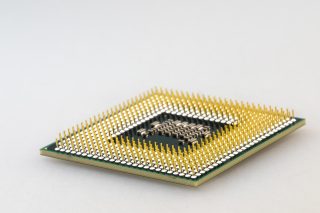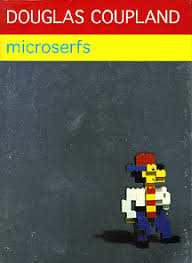
Microserfs is a novel by Douglas Coupland published in 1995 that is extremely poignant and was ahead of its time. It is also an intimate glimpse into the nerd/geek mind the likes of which I’ve only experienced in my own head.
To borrow the text from the back cover;
They are Microserfs—six code-crunching computer whizzes who spend upward of sixteen hours a day “coding” and eating “flat” foods (food which, like Kraft singles, can be passed underneath closed doors) as they fearfully scan company e-mail to learn whether the great Bill is going to “flame” one of them. But now there’s a chance to become innovators instead of cogs in the gargantuan Microsoft machine. The intrepid Microserfs are striking out on their own—living together in a shared digital flophouse as they desperately try to cultivate well-rounded lives and find love amid the dislocated, subhuman whir and buzz of their computer-driven world.
Despite being written before the dot-com bubble burst, it’s insights into corporate and start-up culture are still extremely relevant. In fact, beyond work and work/life balance, the relationships found within the pages of Microserfs; interpersonal, intrapersonal, familial, and romantic are an extension of many of the people I know in real life.
Every geek and nerd knows these characters, all of them. To speak in a generalization, we are them and they are us and the people we most closely want to or do associate with.
And that’s what has captured me. This book is perhaps, at times, more a mirror than a novel, more real than fiction. Even if you have never been in circumstances similar to these characters directly, we’ve all had the conversations and relationships that are written of, in great detail, within the book. And we’ve even had the same or similar realizations, as well.
In the afterword (the postscript if you will to the most recent paperback version of the book), there’s a quote “The Sunday Telegraph revelled in Coupland’s sharp eye for detail: ‘All nerd life is here: the quirky obsessions with appalling television shows, the revolting snacks, and the realization that your best relationships are on e-mail.’” And what’s not to love. Seriously, Coupland’s nailed it.
One other thing from the postscript that seems immensely important to mention is “One thing is for sure: Microserfs has already become a historical document, allowing us to peer through the Windows of history.”
Now the book is a journal of sorts. It’s written by Dan from his perspective, and he even includes why he’s writing these things down: “Lately, I’ve been unable to sleep. That’s why I’ve begun writing this journal late at night, to try to see the patterns in my life. From this I hope to establish what my problem is–and then, hopefully, solve it. I’m trying to feel more well adjusted than I really am, which is, I guess, the human condition.”
Human condition aside, I feel like a lot of geeks/nerds have trouble sleeping, perhaps because our minds are always going, but that’s a separate theory and post altogether…
Back to the wonder of Microserfs, and lucky for you I have culled a baker’s dozen of examples to further prove Coupland’s brilliant insights in the nerd/geek culture and mind.
On nerds and their needs:
Nerds get what they want when they want it, and they go psycho if it’s not immediately available. Nerds overfocus. I guess that’s the problem. But it’s precisely this ability to narrow-focus that makes them so good at code-writing: one line at a time, one line in a strand of millions.
On email:
E-mail is like highways–if you have them, traffic follows.
On love:
Do you remember that old TV series, Get Smart? You remember at the beginning where Maxwell Smart is walking down the secret corridor and there are all of those doors that open sideways, and upside down and gateways and stuff? I think that everybody keeps a whole bunch of doors just like this between themselves and the world. But when you’re in love, all of your doors are open, and all of their doors are open. And you roller-skate down your halls together.
On the inevitable dot-com bubble that will burst years after this book’s publication:
“There’s nothing the world wants as little as a new technology company. If you give a company $2 million, they’ll spend it and never ship a profitable product.”
On nerd vs geek:
We got in this discussion about the word “nerd.” “Geek” is now, of course, a compliment, but we’re not sure about the word “nerd.” Mom asked me, “What, exactly, is the difference between a nerd and a geek?”
I replied, “It’s tougher than it seems. It’s subtle. Instinctual. I think geek implies hireability, whereas nerd doesn’t necessarily mean your skills are 100 percent sellable. Geek implies wealth.”
On geek’s self-images within technology:
I say “Ummm. . .” a lot. I mentioned this to Karla and she says it’s a CPU word. “It means you’re assembling data in your head–spooling.”
On time as a commodity:
Time time time. It’s such a current subject. It’s like money–if you don’t have it, you think about it too much.
On the subject of Geek Chic:
I can’t stop marveling at how together geeks are in the Valley. At Microsoft, there was no peer pressure to do anything except work and ship on time. If you did, you got a Ship-it Award. Easy. Black and White.
Here, it’s so much more complicated–you’re supposed to have an exciting, value-adding job that utilizes your creativity, a wardrobe from Nordstrom’s or at the very least Banana Republic, a $400,000 house, a cool European or Japanese car, the perfect relationship with someone as ambitious, smart, and well-dressed as yourself, and extra money to throw parties so that the whole world can come observe what a life you have, indeed. It makes me miss Redmond, but at the same time, it is kind of inspiring. I feel conflicted.
And later to punctuate the point even further:
Even Michael noticed, with a rare lapse into pop culture: “Perhaps David Byrne was talking about the geeks inheriting the earth in that Talking Heads song, ‘This is not my beautiful house! This is not my beautiful wife! My God! How did I get here?’”
On distraction, the likes of which we all experience these days some two decades after this book’s first publication date:
Actually, today was just a big waste of a day, work-wise. I didn’t get anything done because I had too many interruptions. I’d start to do something, then I’d be distracted by something else, forget what I was doing in the first place, and then get so worried that I wasn’t getting anything done, that it wrecked even further my ability to get anything done. Sometimes too much communication is too much communication.
On brains vs. beauty:
I guess supermodels are like geeks, but instead of winning the Punnet Square of brains, they won the Punnet Square of looks. It must be bizarre being fabulously good-looking. I mean, at least you can disguise brains.
On assimilation and identity:
“It starts out young–you try not to be different just to survive–you try to be just like everyone else–anonymity becomes reflexive–and then one day you wake up and you’ve become all those other people–the others–the something you aren’t. And you wonder if you can ever be what it is you really are. Or you wonder if it’s too late to find out.”
On Memory vs. Access:
“There’s one thing computing teaches you, and that’s that there’s no point to remembering everything. Being able to find things is what’s important.”
On the future of size, remember this line was written in the mid-nineties:
Thought: one day the word “gigabits” is going to seem as small as the word “dozen.”
This text is both a masterclass in future sight, as there’s a lot that Coupland got right, but it’s also a course in geek psychology, too. And if nothing in the aforementioned baker’s dozen of snippets from this book interested you, then you would seem to be very far removed from technology and clearly neither a nerd or a geek.
But if you are intrigued, you have to pick up this book and read it for yourself. I just can’t say enough great things about it. It’s just that good.
Read the Secret File of technical information and quotes from Microserfs by Douglas Coupland.




